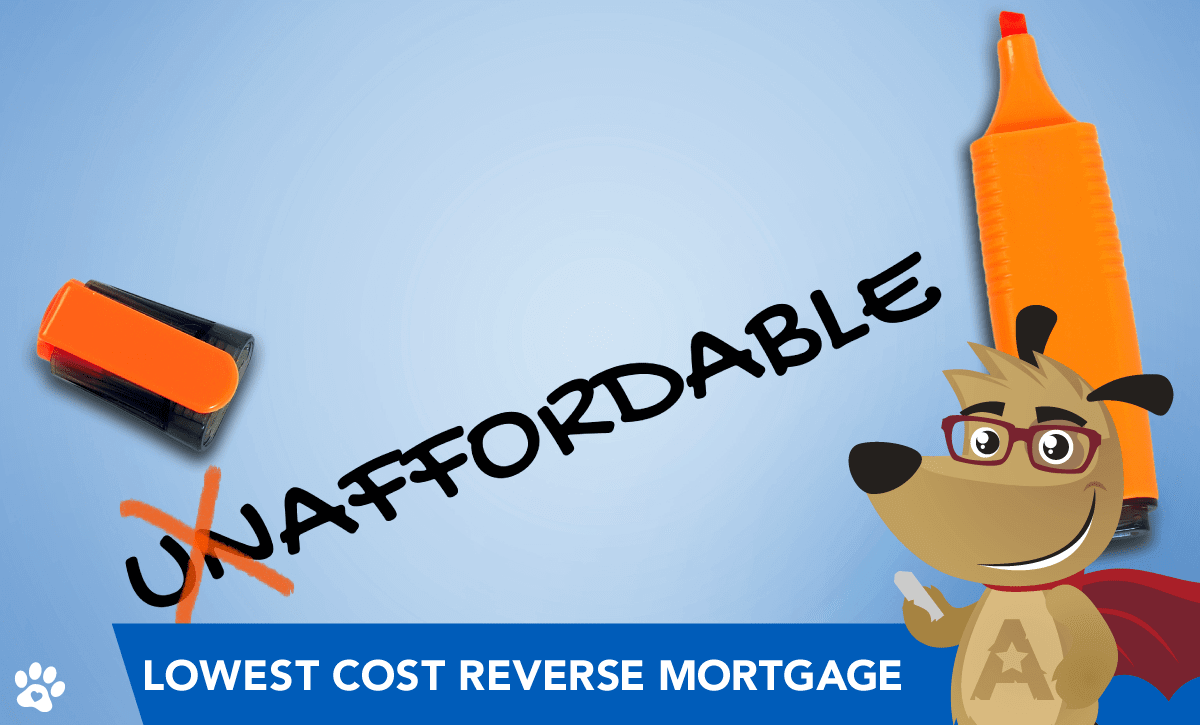
America's #1 Rated Reverse Mortgage Lender*
What Is the Lowest Cost Reverse Mortgage? — How Lender Credits & No-Fee Options Work
 |
Michael G. Branson, CEO of All Reverse Mortgage, Inc., and moderator of ARLO™, has 45 years of experience in mortgage banking, with the past 20 years devoted exclusively to reverse mortgages. A Forbes Real Estate Council member, he developed the industry's first fixed-rate jumbo reverse mortgage and has been featured in Forbes, Kiplinger, the LA Times, and Yahoo Finance. (License: NMLS# 14040) |
 |
Cliff Auerswald, President of All Reverse Mortgage, Inc., and co-creator of ARLO™ — the industry's first real-time reverse mortgage pricing engine — has 27 years of experience in mortgage banking, with 20+ years focused exclusively on reverse mortgages. A recognized expert in reverse mortgage technology and consumer education, he has been featured in Kiplinger, Yahoo Finance, Realtor.com, and HousingWire. (License: NMLS# 14041) |
What is the lowest cost reverse mortgage?
A few years ago, people were reading about how expensive reverse mortgages were, but that is no longer the case. Don’t get me wrong: HUD still charges an initial mortgage insurance premium based on the home’s value, which is 2% of the available principal limit.
Depending on the part of the country in which you live, some of the necessary costs, like title insurance and state and local fees, can still run into the thousands of dollars.
So, what’s the difference now, and how can I call this an “affordable alternative”?…

Mortgages Are Valued by Lenders Based on the Initial Draw That the Borrower Takes
The pricing for lenders at this time is advantageous enough on the higher draws that we can often waive origination fees, give credits to borrowers to help pay their costs, and, in some cases, pay the entire up-front costs of their reverse mortgage (except the counseling fee, which HUD will not allow lenders to pay for borrowers).
Most of the loans we are currently processing have no origination fees (many lenders charge up to $6,000 in origination fees alone). This significantly reduces the charges, but because many also include lender credits, we provide the borrower with funds at closing to help pay the remaining costs.
Some borrowers ask whether a lender credit means we just added the credit to the loan balance or applied it elsewhere. The answer to this is no. If we send you a proposal showing that we are giving you credit to pay costs, that is money we must pay to cover the expenses shown on the estimates.
Even if we credit you for a cost, we must still disclose all transaction costs and who is paying them. If a loan has $10,000 in costs, we must show you all of those costs, even if we apply a $10,000 credit to pay them.
How Can We Get Your Costs This Low?
Because pricing is good enough now, as a direct lender, we can cover borrowers’ costs when possible and keep the lights on! The pricing we receive when selling loans in the secondary market will not always cover borrowers’ costs. And because we receive compensation based on the amount of the loan the borrower draws at closing, we cannot pay costs in all instances. But when we can, we will.
The bottom line is that borrowers can get a reverse mortgage and save thousands (and sometimes tens of thousands) of dollars now, while pricing for these loans is strong. We encourage borrowers who have been on the fence about reverse mortgages, or who decided against them at some point because they thought the upfront costs were too high, to reconsider now.
It costs nothing to request a proposal, and we don’t believe in badgering borrowers if you’re trying to decide. The loan must be right for you, and you don’t need us or anyone else constantly calling, emailing, and putting pressure on you to choose or act. If the loan is right for you and you want to proceed, we’re happy to help.
If you’re unsure or you’re certain it’s not suitable for your circumstances, the last thing you need is someone trying to pressure you into something you don’t want to do. If you would like to determine whether a low- or no-cost reverse mortgage is available, please let us know, and we will be happy to send you a proposal.
Closing Cost FAQs
What are the typical closing costs for a reverse mortgage?
What is the least expensive reverse mortgage?
Are closing costs on a reverse mortgage deductible?
What is the current interest rate for a reverse mortgage?
What is the maximum origination fee for a reverse mortgage?
Want the Most Cost-Effective Reverse Mortgage? Get a free, custom quote from All Reverse Mortgage, Inc. (ARLO™) — America’s #1 Rated Lender with a 4.99/5-star rating! Call (800) 565-1722 or click here for your free quote — simple, trusted, 100% secure!

 Michael G. Branson
Michael G. Branson Cliff Auerswald
Cliff Auerswald

September 8th, 2024
September 9th, 2024
October 6th, 2022
October 12th, 2022
April 4th, 2019
April 4th, 2019
December 11th, 2015
December 21st, 2015